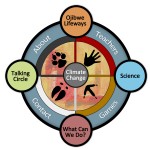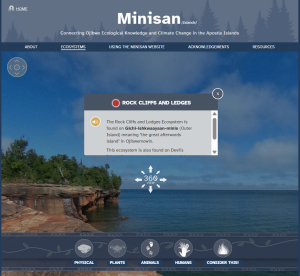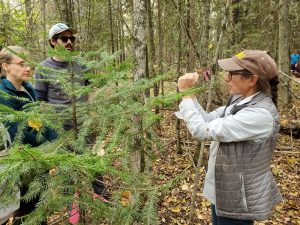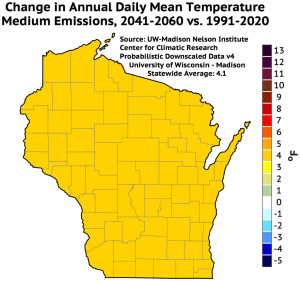G-WOW “Guiding for Tomorrow” Changing Climate, Changing Culture
Gikinoo’wizhiwe Onji Waaban means “Guiding for Tomorrow” in the Ojibwe language. It is the name given for a educational framework for investigating climate change through its impact on the sustainability of beings (species) and habitat that support cultural and economic practices we value. We call it “G-WOW.”
The G-WOW framework applied as a website curriculum features four seasonal units, plus a unit on climate change and water. Learners apply Ojibwe traditional ecological knowledge (TEK) and place-based investigations with academic climate research to investigate climate change within their own culture. G-WOW promotes community level action to increase resiliency.
The G-WOW website features lesson plans, activity guides, climate change resources, program data bases, visual resources, games, and more. Ojibwe culture and language are infused into the curriculum.
Click here for research by Patty Carpenter-University of Minnesota-Duluth Master of Education candidate documenting the effectiveness of the G-WOW model in building climate change teaching confidence and effectiveness, no matter the culture or location.
Minisan– Connecting Ojibwe Ecological Knowledge and Climate Change
The Minisan website takes you on a virtual exploration of 12 different Apostle Islands ecosystems to learn how climate change is affecting the plant and animal beings who live. Each ecosystem features stories of how climate change is affecting the Ojibwe four orders of creation (physical, plant, animal and human orders) through Ojibwe ecological knowledge integrated with “academic” climate science. A “consider this” section will challenge you to think differently about climate change and and what we can do to adapt to its impacts in our communities and cultures. www.minisan.org
Climate Change Presentations
These guided activities engage learners in investigating Wisconsin’s changing climate and how we increase our resiliency. Partial day to multiple day programs can be arranged and customized for middle school to college level students to adult learners. These activities and presentations integrate Ojibwe Traditional Ecological Knowledge and language with academic climate research to build knowledge and encourage action. Contact Cathy Techtmann, cathy.techtmann@wisc.edu for schedule a program:
- Whose Science?: Learn how to weave TEK, place-based evidence of climate change we are seeing, and academic science to evaluate have Wisconsin’s changing climate can affect you and your community.
- Beings on the Move: An interactive activity where participants interact as different plant and animal beings and discover who may be “moving on” from Wisconsin due to our changing climate (indoor or outdoor activity)
- Forests on the Move: Step into the forest to mark trees that may be “moving on” from Wisconsin under different Wisconsin climate futures. Investigate how could these changes affect our community’s cultures and economies.
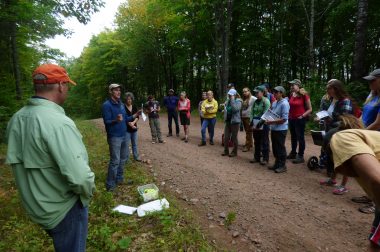 Climate Change Professional Development Training & Field Courses
Climate Change Professional Development Training & Field Courses
Check out our Climate, Ecology and Culture Field Courses to get an idea of customized type of learning experiences we can offer. Professional development presentations on climate change can also be arranged for workshops and conferences upon request. Contact cathy.techtmann@wisc.edu for more information.
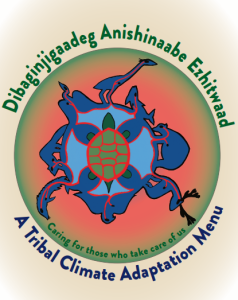 Traditional Ecological Knowledge & Climate Change Resources
Traditional Ecological Knowledge & Climate Change Resources
Aanji-bimaadiziimagak o’ow aki- Climate Vulnerability Assessment… a pdf download that describes the vulnerability of 66 plant and animal beings (species) to climate change based on traditional ecological knowledge (TEK) of the Lake Superior Ojibwe people and “academic” science. A rich resource for understanding the impacts of climate change on treaty rights and Ojibwe culture.
Dibaginjigaadeg Anishinaabe Ezhitwaad-A Tribal Climate Adaptation Menu... a pdf download for integrating Ojibwe indigenous ecological knowledge, culture, and language into climate adaptation actions.
“Protect Our Rice” Video… produced by Bad River tribal youth during the 2012 Tribal Youth Media Workshop with the assistance of Patty Loew, Ph.D. Professor, UW-Madison Dept. Life Sciences Communication. Explores wild rice as a cultural resource and examines threats to it, including weather and mining.
Scientific Ecological Knowledge Climate Resources-Wisconsin
Wisconsin Climate Connection… the University of Wisconsin-Extension’s climate change website!
Wisconsin Initiative on Climate Change Impacts… a website that provides resources to understand the science of climate change, mitigation, and adaption strategies. Climate change projections are depicted using easy to understand maps.
Wisconsin State Climatology Office… specialized information on monthly and yearly changes in Wisconsin’s weather and climate.
Northern Institute of Applied Climate Science... a robust website from the US Forest Service featuring climate impacts on northern forests, including Wisconsin.
Changes in Lake Superior Ice Cover, supporting documentation: Bayfield Harbor Ice Dates 1857-2011.
****************************
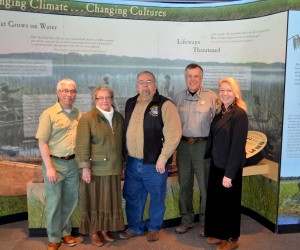 Our Changing Climate, Changing Culture educational outreach has been developed through a collaboration between the University of Wisconsin-Extension, the Great Lakes Indian Fish and Wildlife Commission (GLIFWC), Chequamegon-Nicolet National Forest-US Forest Service, and Apostle Islands National Lakeshore-National Park Service with funding through the WI Coastal Management Program, NOAA, the Great Lakes Restoration Initiative, NASA, and the National Parks Foundation. With additional assistance from the Bad River and Red Cliff Bands of the Lake Superior Ojibwe, the Wisconsin Initiative on Climate Change Impacts, the Great Lakes Restoration Initiative, the Northern Institute of Applied Climate Science-USDA Forest Service, and many others! Chi Miigwech (a big thank-you) for your support!
Our Changing Climate, Changing Culture educational outreach has been developed through a collaboration between the University of Wisconsin-Extension, the Great Lakes Indian Fish and Wildlife Commission (GLIFWC), Chequamegon-Nicolet National Forest-US Forest Service, and Apostle Islands National Lakeshore-National Park Service with funding through the WI Coastal Management Program, NOAA, the Great Lakes Restoration Initiative, NASA, and the National Parks Foundation. With additional assistance from the Bad River and Red Cliff Bands of the Lake Superior Ojibwe, the Wisconsin Initiative on Climate Change Impacts, the Great Lakes Restoration Initiative, the Northern Institute of Applied Climate Science-USDA Forest Service, and many others! Chi Miigwech (a big thank-you) for your support!
